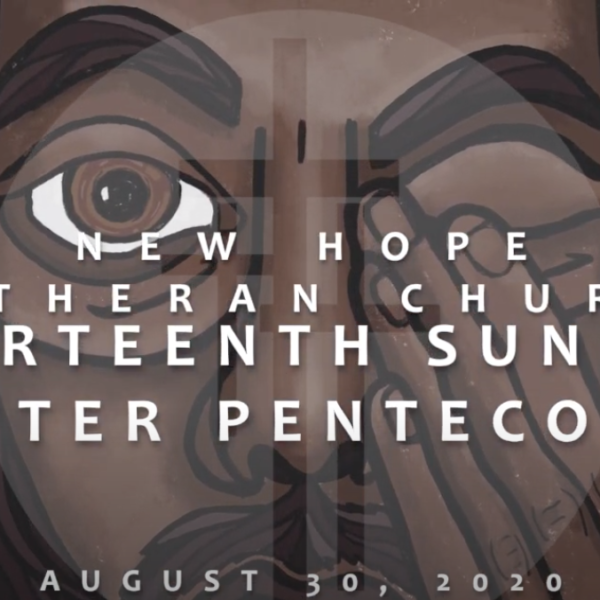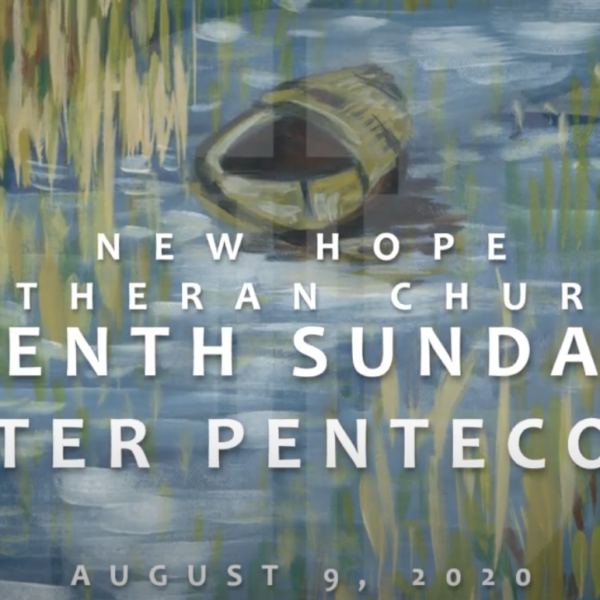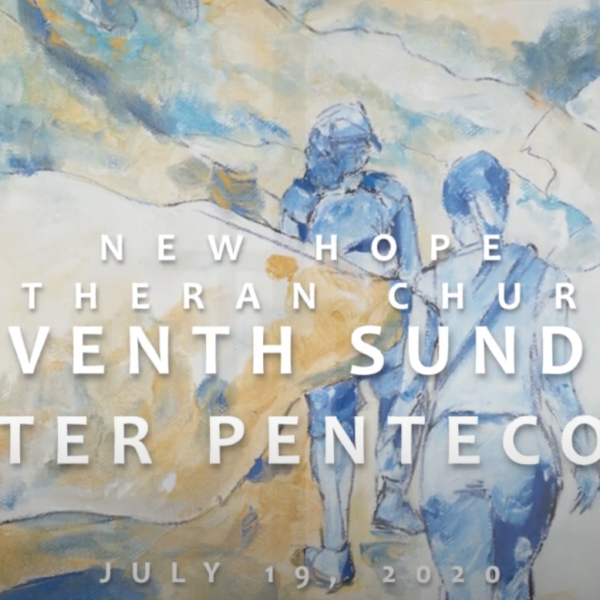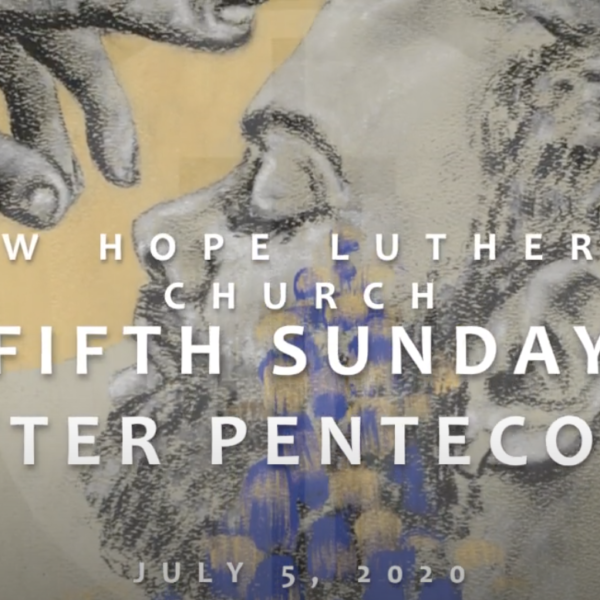Thirteenth Sunday after Pentecost 2020
Matthew 16:21-28
21 From that time on, Jesus began to show his disciples that he must go to Jerusalem and undergo great suffering at the hands of the elders and chief priests and scribes, and be killed, and on the third day be raised. 22 And Peter took Jesus aside and began to rebuke him, saying, “God forbid it, Lord! This must never happen to you.” 23 But Jesus turned and said to Peter, “Get behind me, Satan! You are a stumbling block to me; for you are setting your mind not on divine things but on human things.”
24 Then Jesus told his disciples, “If any want to become my followers, let them deny themselves and take up their cross and follow me. 25 For those who want to save their life will lose it, and those who lose their life for my sake will find it. 26 For what will it profit them if they gain the whole world but forfeit their life? Or what will they give in return for their life?
27 “For the Son of humanity is to come with his angels in the glory of God, and then he will repay everyone for what has been done. 28 Very truly I tell you, there are some standing here who will not taste death before they see the Son of humanity coming in God’s dominion.”
—————
Please pray with me this morning, church:
Holy God,
We end where we began,
Grieving the unraveling,
Lamenting what’s lost,
And mourning the undone.
Open our eyes to the new life
You’re bringing forth.
Point our attention to the resurrection
Happening among and within us.
Amen.
—————
When we began our summer worship and education series Unraveled, we talked a lot about what unraveling entails.
When planning it, we thought that it’d be a good thread of conversation for our congregation, but I don’t think we realized it would feel so timely or so important to our shared life together.
The idea of plans falling apart feels much more descriptive of needing to reschedule a happy hour or a dinner date or revisit vacation plans…much more than we think to use it to describe how our lives and even our world comes unraveled. But what these scriptures and stories have broken open for me in a wildly new way this year, is just how holy unraveling can be.
Earlier in the summer, I compared the idea of unraveling to a knotted-up ball of string or yarn…or the Christmas lights you pull out every year…or the headphones I stuff into my bag… The thing is, there’s a lot in our lives and in our world that feels like it’s already come unraveled…but I think there’s so much more in our lives and in our world that is in need of being unraveled.
I wonder, how many of you find yourselves thinking about what life will be like once we get on the other side of this pandemic? How many of you imagine a return to the way things were, the way we used to do things?
I’ll be honest with you, the longer this goes on, the more I think a return to what was isn’t possible. I think COVID-19 and this pandemic have fundamentally altered our way of living and being once they’re gone. Sure, at some point we’ll get to take off our masks and we won’t be quite as paranoid about shaking hands or being in close proximity to someone else, but when I think about how much more often we facetime with our friends and family when I think about how much more I enjoy cooking and eating a meal together when I think about how much more time we spend as a family in the evenings and on the weekends…I mean, can you really imagine going back to the same breakneck speed of work that you were running before this pandemic?
We’ve had to change and adapt how we worship…we’re having to change and adapt how we do faith formation…can you really imagine going back to not using the tools we have available to us to reach more people with the good news of the love of God in Christ?
In the unraveling, something new is able to come up and flourish.
In our unlearning, something new is able to be taught and nurtured.
In the falling apart, something new is able to be built up.
I told you that I constructed our summer series in such a way that tried to pair the Unraveled readings with the Gospel lessons from the Revised Common Lectionary over these past 12 weeks. I also said that I tried to construct and convey an arc of movement for us—I wanted the series to feel like we were moving from a place of grieving and honoring what had been lost…to a place of hopefulness and looking beyond the future into what’s next.
We end our series today with a seminal story that we heard a few months ago of Thomas. Thomas…the disciple who, I think, gets a bad rap, but who really just wanted what all the other disciples got…to see Jesus.
I chose this story to end our series because it’s the only one that has an explicit connection to resurrection. The resurrected Jesus comes and stands among the disciples and pronounces peace. Do not doubt, but believe… Do not doubt…but trust…
Trust that resurrection is possible.
Trust that resurrection has happened.
Trust that resurrection is happening.
But also remember that Easter Sunday only comes by way of Good Friday. You don’t get to the empty tomb without the crucifixion. You don’t get resurrection, without first dying.
Dying to self-absorbed ways of living.
Dying to self-centered ideologies.
Dying to ways of being that center ourselves at the expense of others.
Hope and rejoicing are given space because of the lament and grief of loss.
Things have to be unraveled before they can be brought back up together again.
And none of this means that there won’t be stumbles along the way. Remember last week when I said I like Peter because Peter is us…Peter is me. Peter, the great rock upon which the Church of Christ is to be built…Peter, the great cornerstone…has become Peter, the persistent stumbling block this week. Peter is us because we won’t always get it right. Sometimes we’ll get in the way of God’s work in the world. Sometimes, like Peter, we’ll deny ever knowing Jesus, whether through our words or our actions.
But also like Peter, I hope we’re persistent. I hope we persist in trying to be that disciple that follows closely to Jesus. I hope we persist in trying to be that disciple Jesus is proud of.
And even when we fail…I hope we’re persistent in trusting in the love and forgiveness of God despite our imperfections…despite our failed attempts…and despite our proclivity for putting ourselves before others.
I wrote and I’m preaching this sermon just as Hurricane Laura sits just off the Gulf Coast, barreling toward the Texas-Louisiana border, projected to come onshore as a strong Category 4 hurricane.
This, just 3 years and 1 day after Hurricane Harvey made landfall down near Rockport.
There is no shortage of unraveling in our world.
Jacob Blake was shot 7 times in the back in front of his 3 kids by Kenosha police officers as he was getting in his car. Those that shot and killed Breonna Taylor while serving a no-knock warrant at the wrong house in Louisville have yet to be even investigated, much less disciplined.
There’s no shortage of unraveling in our world.
But what new thing will be able to spring up?
What resurrection will be allowed to take place?
I want you to watch as Houstonians do what we do in the coming days, as hundreds of us flock to Beaumont and Port Arthur and Lake Charles to help them clean up and begin to build back.
Watch as peaceful protestors slowly yet steadily begin to bend that arc of the moral universe back toward justice.
Watch as life and goodness and justice and love are borne out of the wounded hands and sides of Christ’s very self.
I want you to hear what I just said there… It is out of the struggle, the pain, the strife…it is out of the hurt and worry and anxiety…it is out of the wounds and scars…that life is brought forth. This is the fundamental truth of the resurrection. It is out of the scarred and wounded body of Christ that eternal love and justice and life without end is brought into the world.
There is no more comforting promise in all of Scripture—God is with you in the midst of your pain because God has endured your pain.
Notice what’s unraveled…grieve what’s come undone…lament what’s lost…but keep your eyes peeled for the coming resurrection…
Pay attention for the new thing that God is doing.
Lean into the holiness of the unraveling.
And stick around for what’s on the way.






